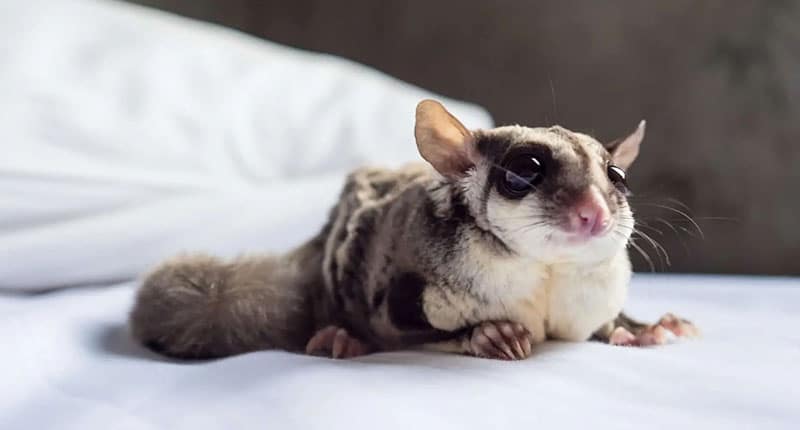Sugar gliders are adorable and sociable creatures that make popular pets. These small, nocturnal marsupials are known for their unique characteristics and energetic behavior. If you’re considering adopting a sugar glider or already have one, it’s crucial to provide them with the proper care to ensure their health and well-being. In this article, we will explore essential tips for sugar glider care, covering everything from their habitat and diet to socialization and overall health. Let’s dive in!
Sugar gliders, scientifically known as Petaurus breviceps, are native to Australia, Indonesia, and New Guinea. With their inquisitive nature and ability to glide through the air, these tiny marsupials have captured the hearts of pet owners around the world. However, it’s important to remember that sugar gliders have unique care requirements that must be met to ensure their well-being.
Creating a Suitable Habitat
When it comes to housing sugar gliders, a spacious cage with plenty of vertical space is essential. The cage should be equipped with branches, perches, and platforms for climbing and jumping. Additionally, providing toys, ropes, and tunnels will keep your sugar gliders entertained and mentally stimulated.
Providing a Nutritious Diet
A well-balanced diet is crucial for the health of sugar gliders. Their diet mainly consists of a combination of fresh fruits, vegetables, and a high-quality pellet or glider-specific food. It’s important to avoid foods that are toxic to sugar gliders, such as chocolate, caffeine, and foods high in sugar or salt.
Ensuring Proper Hydration
Sugar gliders need access to fresh water at all times. You can provide water through a water bottle attached to the cage, ensuring that it is cleaned and refilled regularly. Some sugar gliders also enjoy a shallow dish of water for bathing, which can be offered a few times a week.
Grooming and Maintaining Cleanliness
Regular grooming is necessary to keep your sugar glider’s fur and skin healthy. They have scent glands, so occasional bathing may be required to reduce odors. It’s important to use glider-safe shampoos and ensure that the bathing area is warm and comfortable. Additionally, cleaning the cage regularly will help maintain a hygienic environment for your gliders.
Socialization and Bonding
Sugar gliders are highly social animals and thrive on interaction. It’s important to spend quality time with your gliders every day, allowing them to bond with you and other members of the household. They enjoy gentle handling, being carried in bonding pouches, and engaging in playtime activities.
Promoting Physical and Mental Stimulation
Sugar gliders are active animals that require physical and mental stimulation to stay healthy and happy. Provide them with a variety of toys, climbing structures, and puzzle feeders to keep their minds and bodies engaged. Interactive play sessions and hiding treats can help stimulate their natural instincts.
Understanding Health Concerns
To ensure the well-being of your sugar gliders, it’s important to be aware of common health concerns. These may include dental problems, obesity, parasites, and nutritional deficiencies. Regularly observe your gliders for any signs of illness or discomfort and consult a veterinarian experienced in sugar glider care if you have any concerns.
Regular Veterinary Check-ups
Routine check-ups with an experienced exotic pet veterinarian are essential for maintaining the health of your sugar gliders. These check-ups allow for preventive care, early detection of potential issues, and necessary vaccinations. Follow your vet’s recommendations for vaccinations and deworming treatments.
Handling and Interacting Safely
When handling sugar gliders, it’s important to be gentle and cautious. Avoid grabbing or squeezing them, as they are delicate animals. Instead, let them climb onto your hand or use a glider-safe pouch for handling. Always supervise interactions with other pets or children to ensure the safety of your sugar gliders.
Training and Behavioral Enrichment
Sugar gliders can be trained to perform simple commands and tricks using positive reinforcement techniques. This not only strengthens the bond between you and your gliders but also provides them with mental stimulation and a sense of accomplishment. Consider clicker training and introduce new challenges gradually.
Traveling with Sugar Gliders
If you plan to travel with your sugar gliders, it’s important to make appropriate arrangements. Ensure they have a secure travel carrier or pouch and provide familiar bedding and toys to reduce stress. Avoid exposing them to extreme temperatures and provide ample food, water, and toilet breaks during the journey.
Dealing with Common Challenges
Owning sugar gliders may come with certain challenges, such as biting, scent marking, or nocturnal vocalizations. Understanding their behavior and needs will help you address these challenges effectively. Patience, consistency, and positive reinforcement techniques can be used to modify unwanted behaviors.
Safety Precautions at Home
Sugar gliders are curious creatures and can easily get into dangerous situations if not supervised. Take precautions to secure windows, electrical cords, toxic plants, and small objects that can be ingested. Ensure that their play area is glider-proofed and free from hazards.
Conclusion
Caring for sugar gliders requires time, dedication, and knowledge about their unique needs. By following the essential tips outlined in this article, you can provide your sugar gliders with a happy and healthy life. Remember to create a suitable habitat, provide a nutritious diet, promote socialization and stimulation, and prioritize their overall well-being. With proper care and attention, you can enjoy a rewarding and fulfilling relationship with your adorable sugar gliders.
FAQs
1. Can sugar gliders be kept as solitary pets?
- Sugar gliders are highly social animals and thrive in the company of their own kind. It is generally recommended to keep them in pairs or small groups to prevent loneliness and ensure their well-being.
2. How long do sugar gliders live?
- With proper care, sugar gliders can live up to 12-15 years in captivity. Providing a nutritious diet, regular veterinary care, and a stimulating environment can contribute to their longevity.
3. Are sugar gliders noisy at night?
- Yes, sugar gliders are nocturnal animals and may exhibit vocalizations during their active hours at night. This is a natural behavior and can be minimized by providing them with ample enrichment and mental stimulation during the day.
4. Can sugar gliders be potty trained?
- Sugar gliders can be trained to use a specific area as a toilet, but complete potty training is rare. It’s recommended to provide absorbent bedding in their cage and clean it regularly to maintain cleanliness.
5. Are sugar gliders legal to own as pets?
- The legality of owning sugar gliders as pets varies by country and state. It’s important to research and understand the local regulations and obtain any necessary permits before acquiring a sugar glider as a pet.








